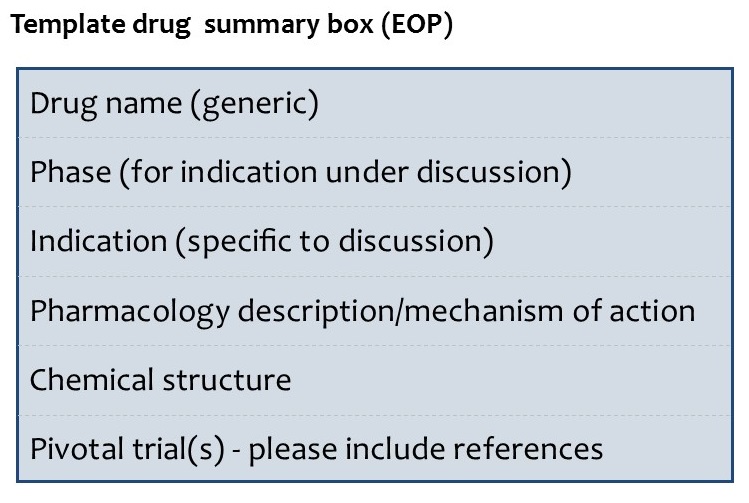Drug Evaluations: Expert Opinion on Pharmacotherapy
A guide for authors submitting to the Expert Collection
Scope
Drug Evaluations must review the clinical data on an approved indication (where relevant), including a review of new efficacy and safety data and emerging pharmacoeconomic data where available. The purpose of the Drug Evaluation is to promote best practice in use of the drug. For launched drugs the information should be limited to approved indications and avoid off-label discussion.
Peer review
All articles are subject to peer review by 2-3 independent reviewers. As the Drug Evaluations include in-depth analysis of a single compound, the manuscript will also be sent to the company responsible for marketing or developing the drug to check the accuracy of the data. This is for a technical check only and the final editorial decision is based entirely on the recommendation of the independent peer review. Comments remain confidential and are shared only with the corresponding author or submitting party.
Explore the Expert Collection
Discover all Expert Collection, journal specific guidelines.
Word limit
The word limit for Drug Evaluations is 3,000 words (not including tables, figures and references).
Every article must contain
Please note that only the address of the first author of the article will appear on Medline/PubMed, not necessarily the corresponding author.
The aim of the abstract is to draw in the interested reader and provide an accurate reflection of the content of the paper. We therefore request the following structure is followed for full-length review articles:
Introduction: Authors are required to describe the significance of the topic under discussion.
Areas covered: Authors are required to describe the research discussed and the literature search undertaken.
Expert opinion: Authors are required to summarise briefly their Expert opinion section.
References must not be included in the abstract.
Which competitor compounds/classes of compounds are in the clinic/late development?
Introduction to the compound
Chemistry
Pharmacodynamics
Pharmacokinetics and metabolism
Clinical efficacy: (Phase I studies), Phase II studies, Phase III studies, Post-marketing surveillance
Safety and tolerability
Regulatory affairs
– What, if any, improvement does the drug hold over other therapies?
– What, if any, impact is this drug likely to have on current treatment strategies?
– How likely are physicians to prescribe the drug?
– What data is still needed?
– Where is drug likely to be in 5 years’ time?
Please note that ‘opinions’ are encouraged in the Expert opinion section, and as such, referees are asked to keep this in mind when peer reviewing the manuscript. However, authors are requested to focus their discussion on approved uses of the drug.

If you are unable to provide this information, editorial support will be provided.